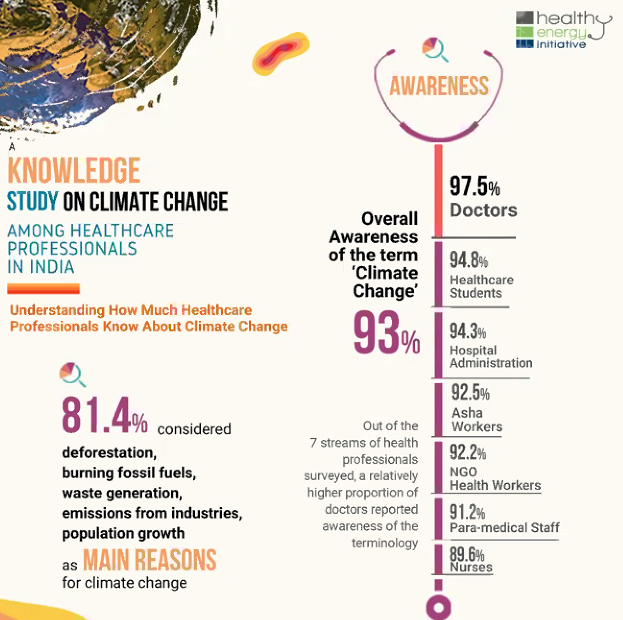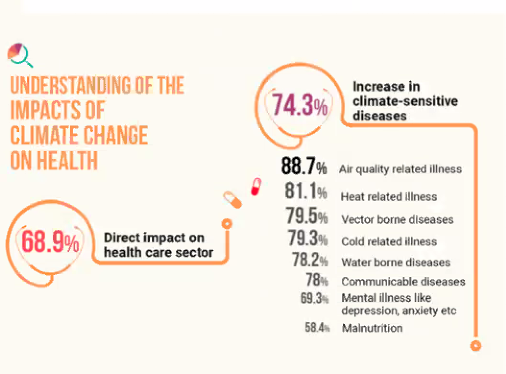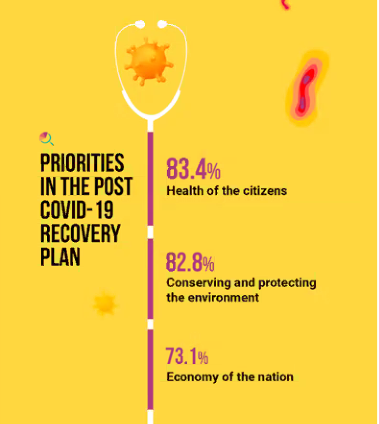The healthcare sector has a responsibility to address climate change and reduce its carbon footprint: Study
A survey by a network of health professionals revealed that over 68% of healthcare workers across the country believed that climate change has a direct impact on the health sector, and over 85% of respondents believed the healthcare sector has a responsibility to address climate change.


Photo: Scott Carney/flickr
A first-of-its-kind study to understand the perception and practice of the healthcare sector towards climate change shows the health sector should play a crucial role in action and advocacy on climate change in India.
The study was conducted by Healthy Energy Initiative, a network of health professionals, health organisations, and academic research institutions. Over 68 per cent of the respondents believed climate change has a direct impact on the health sector, and over 85 per cent of respondents believed the healthcare sector has a responsibility to address climate change and reduce its own carbon footprint.
More than 81 per cent of respondents agreed that deforestation, burning fossil fuels, waste generation emissions from industries and population growth are the main reasons for greenhouse gas emissions, which result in rampant climate change — these were the key findings of the study conducted among over-3,000 healthcare professionals in India in collaboration with data agency Morsel India.

A total of 3,062 healthcare professionals, including doctors, nurses, paramedical staff, hospital administrators, ASHA [Accredited Social Health Activist] workers, not-for-profit health staff and healthcare students were surveyed in this study conducted between August and December last year.
The study also showed that healthcare workers understand the health impact of air pollution. As many as 88.7 per cent of respondents believed that air pollution-related illnesses will have a direct impact on the health sector, and ranked it as the highest threat among heat and cold-related illnesses, vector and water-borne diseases, communicable diseases, mental illnesses and malnutrition.

ASHA workers more aware of climate change than nurses
The survey showed that overall awareness of climate change among all sections of health workers is as high as 93 per cent. At 97.5 per cent, doctors were the most aware, followed by healthcare students (94.8 per cent) and hospital administration staff (94.3 per cent). At 92.5 per cent, ASHA workers ranked fourth. Nurses (89.6 per cent) were are the least aware of climate change, its causes, impacts and links to human health among all the healthcare workers. Since ASHA workers deliver government healthcare to the last mile, they are, likely, more aware.
“The findings of the study clearly indicate that health sector leaders want the sector to be at the front and centre of action and advocacy on climate change,” said Arvind Kumar, founder trustee, Lung Care Foundation, Delhi, at a webinar where the study was released yesterday.
Healthcare infrastructure not prepared to deal with epidemics in future
The survey, conducted when the country and the world was bearing the brunt of the COVID19 pandemic, revealed that a majority of the respondents did not believe there were adequate preparations to deal with the pandemic, or any future epidemic.
One of the major findings of the survey on priorities in the post-COVID19 recovery plan was that 83.4 per cent of respondents indicated that activities that prioritise the health of citizens must be high on the post-COVID19 recovery plan. Interestingly, 82.8 per cent of the respondents said activities focussing on conserving and protecting the environment in a strict manner is important.

Climate change and its health impacts must be included in medical curriculum
While the survey found high awareness among healthcare professionals on the issue of climate change, it also revealed that not many of them were currently actively raising the issue of climate change and its impact among the public.
The respondents were of the opinion that much work was needed to make healthcare systems climate resilient and that healthcare professionals should be equipped with adequate information to raise awareness among the public. As many as 72.8 per cent of those who participated in the survey agreed that it was the need of the hour that climate change and its health impacts must be included in the medical curriculum in India.
“Climate change is a health issue, and it is quite clear from the study that there is a great opportunity for engaging health sector professionals to embrace climate change mitigation, adaptation and risk reduction practices and embark on a path towards climate resilience,” said Poornima Prabhakaran, deputy director of the Centre for Environmental Health at the Public Health Foundation of India.
“The government should operationalise early warning systems to get advance information about expected climate-induced extreme weather events and diseases, facilitate stronger interdepartmental collaboration, provide sufficient supply of manpower and medicines and speed up setting of climate-resilient health infrastructure to combat the impacts of climate change,” she added.
The study also recommended that healthcare professionals should be provided with information and training on international negotiations on climate treaties, especially the Paris Agreement.
“With COP26 [the 26th conference of the Parties summit on climate change] coming up, the health message needs to be clearly communicated that the causes of air pollution and causes of climate change overlap at least seventy five per cent, which allows us to drive the point in negotiations that more than seven million premature deaths can be associated to air pollution, and if we talk about climate change, we will contribute to saving lives,” said Maria Neira, director, Department of Public Health, World Health Organization, in the webinar.
“This is the type of message that needs to be provided to our policymakers with a very clear modelling scenario. That if you implement the Paris Agreement treaty at a certain rate, these are the number of lives you will save, and a delay will lead to these many deaths, the responsibility for which rests on your shoulders,” she added.

